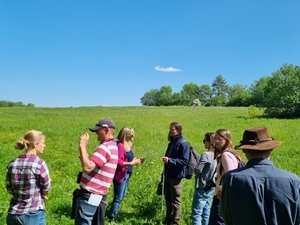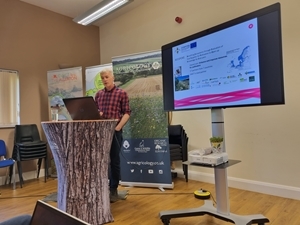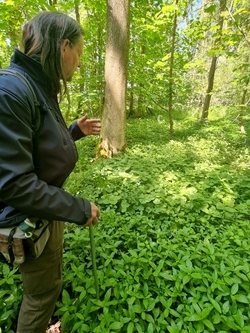By Jayna Connelly, Farmland Ecology Research Assistant
 When your think of “robbers”, who comes to mind? Surely not a cute little honeybee. Over the course of the BEESPOKE project, this is a revelation that has stuck with me from the beginning.
When your think of “robbers”, who comes to mind? Surely not a cute little honeybee. Over the course of the BEESPOKE project, this is a revelation that has stuck with me from the beginning.
As the project draws to a close, there are a number of crucial messages to take away. Pollinators, like many living creatures, need food, shelter and somewhere to nest. The need for floral diversity to provide pollinators with food sources that suit them is a key point around which the BEESPOKE project was largely based.
When the familiar honeybee is only one of 270 bee species in the UK, this diverse group undoubtedly calls for diverse habitats for all of them to call home. Unlike honeybees, wild bee species such as solitary bees and bumblebees do not inhabit hives laid out by humans but may use quality-made bee hotels. Other wild bees use bare earth, tree cavities, tussocky grass and leaf litter.
Since around 75% of the land in the UK is farmed, it is crucial to work with farmers to improve pollinator habitat on their land. For this to be viable sufficient financial support and incentives need to be put in place by governments and regulatory bodies. Providing training and developing networks where knowledge can be shared between land managers is also essential. This is what the BEESPOKE project focused on in its last phase of the project.
Encouraging politicians to put in support mechanisms for pollinators at an event at the EU parliament and encouraging practitioners to put in the management for pollinators at an on-farm event at the Allerton Project.
The BEESPOKE open day at the Allerton Project
 If you attended the BEESPOKE project open day you will have heard Dr John Holland discussing the importance of utilising the strengths of as many of our wild bees as possible. You will have also learnt that honeybees are a common culprit for robbing bell-shaped flowers such as field bean crops. Shorter-tongued honeybees and bumblebee species such as buff-tails often struggle to reach the nectar at the back of deeper flowers and so will bite a hole at the base as a shortcut and ‘rob’ the nectar. This means the bees don’t collect and deposit pollen as they visit different flowers and so don’t provide cross-fertilisation for the crop. Garden bumblebees, however, have much longer tongues, and so will usually forage through the front of the flower, getting covered in pollen and transferring pollen between plants as they visit each flower.
If you attended the BEESPOKE project open day you will have heard Dr John Holland discussing the importance of utilising the strengths of as many of our wild bees as possible. You will have also learnt that honeybees are a common culprit for robbing bell-shaped flowers such as field bean crops. Shorter-tongued honeybees and bumblebee species such as buff-tails often struggle to reach the nectar at the back of deeper flowers and so will bite a hole at the base as a shortcut and ‘rob’ the nectar. This means the bees don’t collect and deposit pollen as they visit different flowers and so don’t provide cross-fertilisation for the crop. Garden bumblebees, however, have much longer tongues, and so will usually forage through the front of the flower, getting covered in pollen and transferring pollen between plants as they visit each flower.
“All bees need a balanced diet, much like humans,” Dr Lucy Capstick presented. Nectar, which is full of sugar, is not enough for the bees to be healthy; they need the protein and carbohydrates provided by pollen too. Providing a variety of flowers through spring, summer and early autumn is essential to support a diverse community of bees. This community will be able to provide their pollination services to crops and wild plants alike the following year.
 John Szczur emphasised the need for varied and often underappreciated nesting sites for bees during his farm tour. Adjacent to the farm, in Loddington church graveyard, there was one grave with slate toppings, home to the only known colony of big-headed mining bees in the county. Next to it, a rather crumbly-looking wall of the church, home to hairy-footed flower bees, among others.
John Szczur emphasised the need for varied and often underappreciated nesting sites for bees during his farm tour. Adjacent to the farm, in Loddington church graveyard, there was one grave with slate toppings, home to the only known colony of big-headed mining bees in the county. Next to it, a rather crumbly-looking wall of the church, home to hairy-footed flower bees, among others.
To preserve and improve pollination services for the future of farming, the economics of maintaining these habitats must be feasible. Ian Fraser, a BEESPOKE project partner from the University of Kent, has been creating a matrix to address this. Saya Harvey also discussed at the Allerton open day the costs, savings and benefits of implementing agri-environment schemes (AES). Using her own farm to give examples, she showed that many areas, particularly around the edges of her fields, do not yield enough crop to even cover the cost of sowing seed there, and so she saves herself the cost and instead earns money through AES in these patches. A local farmer who attended the open day talked about how he has cut costs on his farm by reducing how frequently he cut his hedges. In this way, he makes less work for himself and helps wildlife by allowing hedges such as hawthorn to flower and fruit, providing food for pollinators and farmland birds.
Brussels policy meeting
The opportunity to translate the needs of farmers to politicians in Brussels came on the 30 May at the Policy Influencer event.
Key recommendations were:
- Affordable seed mixes that incorporate locally adapted flower species for the area and soil type are needed.
- AES payments must incentivise farmers and make implementation and management of the schemes economically viable. Moreover, these AESs need to be flexible so that they are accessible and achievable for farmers to implement depending on their needs. For example, AES areas must be flexible in size and shape to allow for differences in machinery.
- Movement towards a culture where tolerance of some weeds that provide high nectar and pollen resources for pollinators is needed.
- Food for pollinators can have multiple benefits if selected based on research. For example, BEESPOKE partners at NIAB created crop-specific wildflower seed mixes that provide nectar and pollen but also encourage beneficial insects and discourage pest species depending on the fruit. Research-based wildflower seed mixes can have great success for pollinators.
- Pesticide drift is a concern that must not be overlooked.
- Training is needed – farmers need the scope and opportunity to try new things as well as learn from each other.
Despite the BEESPOKE project coming to an end, its advice and resources are available to anyone wishing to be inspired and informed by the project’s work. For more information and guides so you can help farmland bees, visit the website.